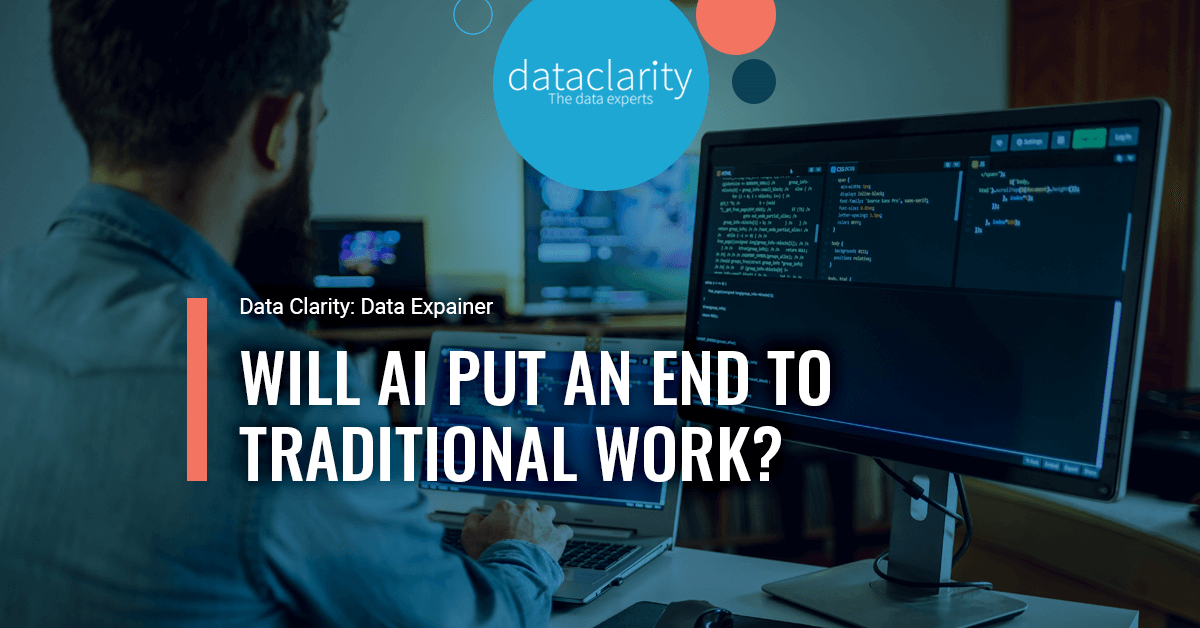Will AI put an End to Traditional Work?
11th December 2023
Will AI eventually mean an end to work? Data Clarity investigates.
It’s clear artificial intelligence (AI) stands as a transformative force for any industry, challenging the foundations of traditional employment. As technological advancements reshape industries, the question looms: Will AI ultimately bring an end to traditional work as we know it?
The integration of AI into various sectors has prompted a paradigm shift in work. Tasks that were once exclusively human are now being automated, creating efficiency but also raising concerns about job displacement.
Only recently, at this year’s AI safety summit, Elon Musk predicted that AI will eventually mean people no longer need to work, adding a layer of complexity to the ongoing dialogue.
Across industries, AI is starting to reshape operational dynamics and securing a competitive advantage. From automation in manufacturing to predictive analytics in financial sectors, businesses are leveraging AI to enhance productivity and to make data-driven decisions. However, this evolution brings forwards new challenges to consider, particularly regarding the adaptability of the workforce:
The Changing Nature of Jobs: As AI becomes more accessible, jobs will transform. Routine and repetitive tasks are becoming increasingly automated, requiring the workforce to upskill and focus on roles that demand critical thinking, creativity, and emotional intelligence – areas where AI currently falls short.
Critical Questions in the Industry: Musk’s assertion that AI could lead to a scenario where no one needs to work sparks critical questions that need answering. While increased automation can streamline processes and boost efficiency, it also raises ethical concerns and prompts discussions about the societal impact of a workforce with diminishing employment opportunities.
Balancing Automation and Human Ingenuity: The future of work lies in striking a delicate balance between automation and human ingenuity. Rather than viewing AI as a threat to jobs, there’s an opportunity to harness its potential for collaboration. Businesses that successfully integrate AI with a human-centric approach are likely to thrive, fostering a work environment where technology enhances rather than replaces human capabilities.
Educational Systems: Preparing the workforce for an AI-driven future necessitates a re-evaluation of educational systems. Emphasising adaptability, critical thinking and digital literacy becomes crucial to equip individuals, or teams for roles that AI can’t replicate. Continuous learning and upskilling programs are essential, with stronger emphasis on AI education.
AI and Economic Disparities: While AI has the potential to drive economic growth, it also raises concerns about exacerbating existing economic disparities. Addressing these issues requires a comprehensive approach that includes policies promoting inclusivity, ethical AI development, and measures to mitigate potential job displacement.
At Data Clarity, the question remains, will AI put an end to traditional work? As dominant voices such as Musk believe AI will be able to “do everything”, we believe we would instead see AI as a transformative force, offering an opportunity for collaborative endeavors rather than posing a threat. We know AI will affect the balance of the workforce, but it won’t lead to a utopia where mankind merely enjoys more leisure time.
The World Economic Forum’s “The Future of Jobs Report 2020” forecasts the replacement of 85 million jobs globally by AI by 2025, but the report also predicts the creation of 89 million new jobs within the same timeframe.
As mentioned, AI presents a opportunity for collaborate endeavors.
Businesses are increasingly recognising the potential of AI to unlock fresh opportunities and enhance productivity across all industries. Envisioning a future where efficiency is paramount, and the possibilities with data are limitless. In sectors like retail, the significance of precisely targeting customers with relevant products at the right moment has become pivotal for success. This underscores the growing importance of understanding customers at a personal level and helping to drive customer retention in today’s market.
It’s also crucial to acknowledge that AI contributes to notable progress towards a greener future. AI serves as a key ally in fostering sustainability, for example, by utilising predictive analysis for identifying cost-saving measures and optimising inventory. Across diverse economic sectors, AI has the capacity to make substantial contributions, managing environmental impacts and addressing climate change. AI has the potential to enable future systems to become more productive in the economy and in harmony with nature.
At Data Clarity, we understand the possibilities that AI holds for organisations today and in the future.
Do you believe AI will put an end to work? What are your thoughts?
Join our community and stay in the know by following our page.
